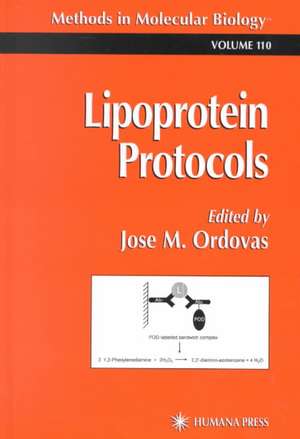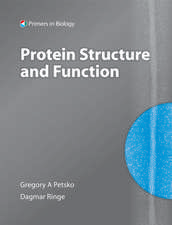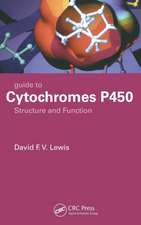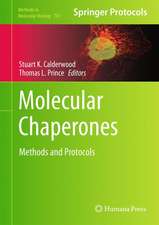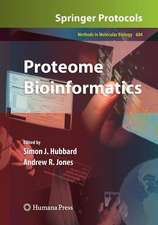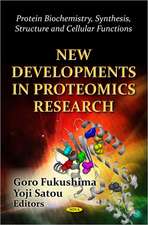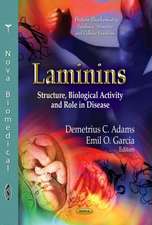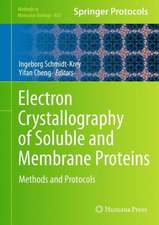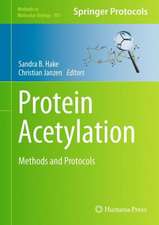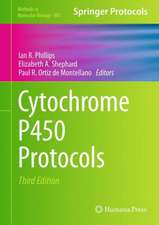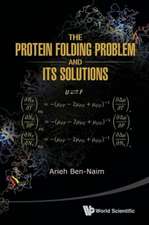Lipoprotein Protocols: Methods in Molecular Biology, cartea 110
Editat de Jose M. Ordovasen Limba Engleză Hardback – 25 aug 1998
| Toate formatele și edițiile | Preț | Express |
|---|---|---|
| Paperback (1) | 641.20 lei 6-8 săpt. | |
| Humana Press Inc. – 10 noi 2010 | 641.20 lei 6-8 săpt. | |
| Hardback (1) | 647.59 lei 6-8 săpt. | |
| Humana Press Inc. – 25 aug 1998 | 647.59 lei 6-8 săpt. |
Din seria Methods in Molecular Biology
- 9%
 Preț: 791.59 lei
Preț: 791.59 lei - 23%
 Preț: 598.56 lei
Preț: 598.56 lei - 20%
 Preț: 882.95 lei
Preț: 882.95 lei -
 Preț: 252.04 lei
Preț: 252.04 lei - 5%
 Preț: 802.69 lei
Preț: 802.69 lei - 5%
 Preț: 729.61 lei
Preț: 729.61 lei - 5%
 Preț: 731.43 lei
Preț: 731.43 lei - 5%
 Preț: 741.30 lei
Preț: 741.30 lei - 5%
 Preț: 747.16 lei
Preț: 747.16 lei - 15%
 Preț: 663.45 lei
Preț: 663.45 lei - 18%
 Preț: 1025.34 lei
Preț: 1025.34 lei - 5%
 Preț: 734.57 lei
Preț: 734.57 lei - 18%
 Preț: 914.20 lei
Preț: 914.20 lei - 15%
 Preț: 664.61 lei
Preț: 664.61 lei - 15%
 Preț: 654.12 lei
Preț: 654.12 lei - 18%
 Preț: 1414.74 lei
Preț: 1414.74 lei - 5%
 Preț: 742.60 lei
Preț: 742.60 lei - 20%
 Preț: 821.63 lei
Preț: 821.63 lei - 18%
 Preț: 972.30 lei
Preț: 972.30 lei - 15%
 Preț: 660.49 lei
Preț: 660.49 lei - 5%
 Preț: 738.41 lei
Preț: 738.41 lei - 18%
 Preț: 984.92 lei
Preț: 984.92 lei - 5%
 Preț: 733.29 lei
Preț: 733.29 lei -
 Preț: 392.58 lei
Preț: 392.58 lei - 5%
 Preț: 746.26 lei
Preț: 746.26 lei - 18%
 Preț: 962.66 lei
Preț: 962.66 lei - 23%
 Preț: 860.21 lei
Preț: 860.21 lei - 15%
 Preț: 652.64 lei
Preț: 652.64 lei - 5%
 Preț: 1055.50 lei
Preț: 1055.50 lei - 23%
 Preț: 883.85 lei
Preț: 883.85 lei - 19%
 Preț: 491.88 lei
Preț: 491.88 lei - 5%
 Preț: 1038.84 lei
Preț: 1038.84 lei - 5%
 Preț: 524.15 lei
Preț: 524.15 lei - 18%
 Preț: 2122.34 lei
Preț: 2122.34 lei - 5%
 Preț: 1299.23 lei
Preț: 1299.23 lei - 5%
 Preț: 1339.10 lei
Preț: 1339.10 lei - 18%
 Preț: 1390.26 lei
Preț: 1390.26 lei - 18%
 Preț: 1395.63 lei
Preț: 1395.63 lei - 18%
 Preț: 1129.65 lei
Preț: 1129.65 lei - 18%
 Preț: 1408.26 lei
Preț: 1408.26 lei - 18%
 Preț: 1124.92 lei
Preț: 1124.92 lei - 18%
 Preț: 966.27 lei
Preț: 966.27 lei - 5%
 Preț: 1299.99 lei
Preț: 1299.99 lei - 5%
 Preț: 1108.51 lei
Preț: 1108.51 lei - 5%
 Preț: 983.72 lei
Preț: 983.72 lei - 5%
 Preț: 728.16 lei
Preț: 728.16 lei - 18%
 Preț: 1118.62 lei
Preț: 1118.62 lei - 18%
 Preț: 955.25 lei
Preț: 955.25 lei - 5%
 Preț: 1035.60 lei
Preț: 1035.60 lei - 18%
 Preț: 1400.35 lei
Preț: 1400.35 lei
Preț: 647.59 lei
Preț vechi: 761.87 lei
-15% Nou
Puncte Express: 971
Preț estimativ în valută:
123.91€ • 129.73$ • 102.53£
123.91€ • 129.73$ • 102.53£
Carte tipărită la comandă
Livrare economică 07-21 aprilie
Preluare comenzi: 021 569.72.76
Specificații
ISBN-13: 9780896034204
ISBN-10: 0896034208
Pagini: 284
Ilustrații: XI, 284 p.
Dimensiuni: 155 x 235 x 21 mm
Greutate: 0.62 kg
Ediția:1998
Editura: Humana Press Inc.
Colecția Humana
Seria Methods in Molecular Biology
Locul publicării:Totowa, NJ, United States
ISBN-10: 0896034208
Pagini: 284
Ilustrații: XI, 284 p.
Dimensiuni: 155 x 235 x 21 mm
Greutate: 0.62 kg
Ediția:1998
Editura: Humana Press Inc.
Colecția Humana
Seria Methods in Molecular Biology
Locul publicării:Totowa, NJ, United States
Public țintă
Professional/practitionerCuprins
DNA- and RNA-Based Methodolog.- PCR Methodology Applied to Genetic Studies of Lipoprotein Metabolism and Atherosclerosis.- Separation of Small-Size DNA Fragments Using Agarose Gel Electrophoresis.- Quantification of mRNA by Polymerase Chain Reaction (PCR) Using an Internal Standard and a Nonradioactive Detection Method.- Generation of Transgenic Mice.- Preparation of Knockout Mice.- Protein-Based Methodology.- Fast Ultracentrifugation Methods for the Separation of Plasma Lipoproteins.- Preparative Isolation of Plasma Lipoproteins Using Fast Protein Liquid Chromatography (FPLC).- Separation of Apolipoproteins by Polyacrylamide Gel Electrophoresis.- Isolation and Purification of Serum Lipoprotein (a) Using Lectin Affinity.- Electrophoretic Separation of LDL and HDL Subclasses.- Measurement of Lipoprotein Particles.- Methodological Approaches for Assessing Lipid and Protein Oxidation and Modification in Plasma and Isolated Lipoproteins.- Separation and Quantitation of Phospholipid Classes by HPLC.- Assays of Lecithin Cholesterol Acyltransferase (LCAT).- Determination of the Mass Concentration and the Activity of the Plasma Cholesteryl Ester Transfer Protein (CETP).- In Vitro Measurement of Lipoprotein and Hepatic Lipases.- Cellular Assays for Lipoprotein Receptors.- Measurements of Proteoglycan—Lipoprotein Interaction by Gel Mobility Shift Assay.
Recenzii
"This text makes a good selection with admirable breadth and a high general quality of method description."-Clin Chem Lab Med
"The book presents the state-of-art of molecular biology and protein techniques specific for lipoprotein research...The book may be especially recommended for students who start working on lipoproteins, but may also be generally helpful for molecular biologists..."-Nahrung
"Each chapter contains, besides a description of the principle of the methods, highly instructive protocols and lists of the technical requirements and reagents. Notes with additional information, e.g. special experimental conditions or safety and technical advises as well as numerous references are given. The book may be especially recommended for students who start working on lipoproteins, but may also be generally helpful for molecular biologists."-Nahrung
"The book presents the state-of-art of molecular biology and protein techniques specific for lipoprotein research...The book may be especially recommended for students who start working on lipoproteins, but may also be generally helpful for molecular biologists..."-Nahrung
"Each chapter contains, besides a description of the principle of the methods, highly instructive protocols and lists of the technical requirements and reagents. Notes with additional information, e.g. special experimental conditions or safety and technical advises as well as numerous references are given. The book may be especially recommended for students who start working on lipoproteins, but may also be generally helpful for molecular biologists."-Nahrung
Textul de pe ultima copertă
In Lipoprotein Protocols, Jose Ordovas compiles a cutting-edge collection of molecular protein techniques for studying advanced aspects of lipoprotein structure and metabolism. These step-by-step methods allow both the beginning and the advanced researcher to carry out not only fundamental, but also the most advanced genetic screening techniques, including RT-PCR and the preparation of relevant models of transgenic and knockout mice. In addition, novel techniques are presented to characterize plasma lipoproteins, their subfractions, and their modifications, and to determine the activity of relevant enzymes and carrier proteins. Each method is described in easily reproducible detail by hands-on experts who have perfected it.
Lipoprotein Protocols offers many powerful tools for unraveling the complexity of lipoprotein metabolism and determining the individual risk of coronary heart disease. For
all those basic and clinical investigators seeking to advance the frontier of lipoprotein research and develop novel genetic therapies for the treatment of cardiovascular disease, this eminently useful book constitutes the new standard reference and guide.
Lipoprotein Protocols offers many powerful tools for unraveling the complexity of lipoprotein metabolism and determining the individual risk of coronary heart disease. For
all those basic and clinical investigators seeking to advance the frontier of lipoprotein research and develop novel genetic therapies for the treatment of cardiovascular disease, this eminently useful book constitutes the new standard reference and guide.
